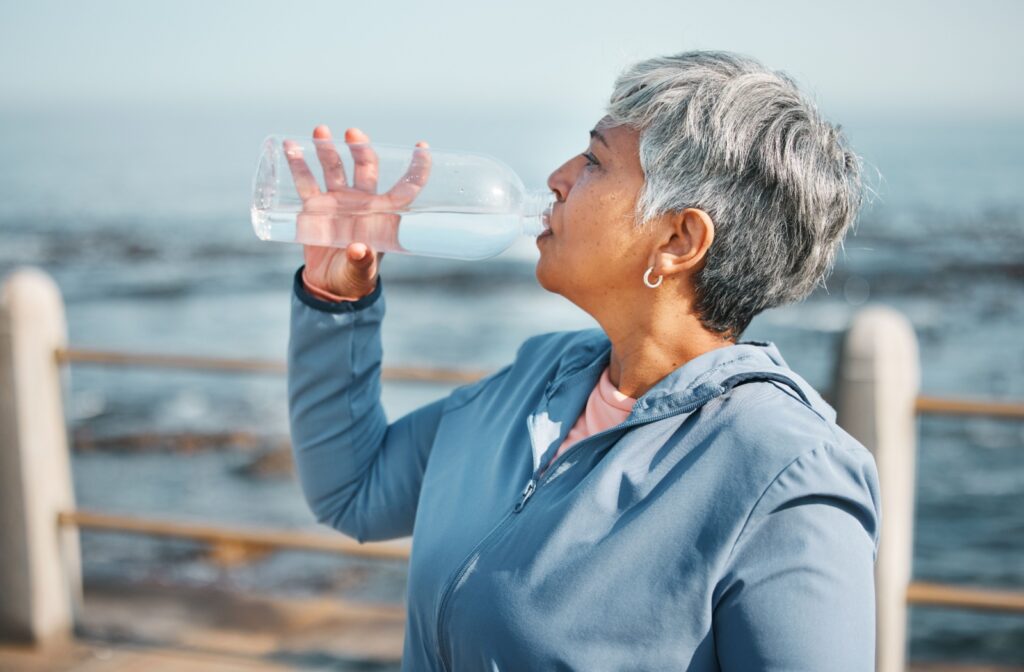Dry, scratchy, and irritated eyes can make even the simplest tasks a frustrating mess. Whether they stem from long hours in front of a computer or outdoor activities on hot days, dry eyes can alter how you experience everyday life.
While there are many ways to address this discomfort, what you eat and drink has a direct impact on eye moisture. By staying hydrated and incorporating key nutrients into your diet, you can better manage dry eye symptoms and support healthy tear production.
Drinking Water to Support Tear Production
Your body is made up of about 60% water, and you use that water to fuel many of your bodily functions. Your tears are no exception. Tears play a significant role in protecting and lubricating your eyes, delivering nutrients, and washing away irritants. Water is an essential component of tear production, helping your tear film remain stable and effective.
When your hydration levels are low, tear volume can decrease, potentially leading to discomfort and dryness.
How Much Water Do You Need?
The usual advice for water is that you should drink 8 cups of water per day (roughly 2 liters). However, everyone is different. Your specific needs depend on factors like age, sex, activity level, and even the climate you live in. Children may need anywhere from 5 cups to 11 cups a day. The average man may need as many as 13 cups, while women may need up to 9 cups. This can also change if you become pregnant or are breastfeeding, as you may need more.
Listen to your body and aim to maintain consistent hydration throughout the day. You can do this by watching for signs of dehydration, including:
- Dry mouth
- Dry eye
- Confusion and mood changes
- Overheating
- Constipation
- Kidney stones
- Shock
Foods to Keep You Hydrated
Hydration doesn’t just come from what you drink. Many foods have high water content, which can contribute to your daily intake. Consider incorporating these hydrating options into your routine:
- Cucumbers (95% water)
- Watermelon (92% water)
- Oranges (88% water)
- Celery (95% water)
Herbal teas and coconut water are also excellent alternatives to sugary or caffeinated drinks.

Essential Nutrients for Tear Health
Beyond hydration, the right nutrients can strengthen and support your eyes’ ability to stay naturally lubricated. Incorporating foods rich in omega-3 fatty acids, vitamin A, and zinc can have a profound impact on eye health.
The Benefits of Omega-3 Fatty Acids
Omega-3 fatty acids can help reduce inflammation in the eye and support the tear film’s lipid layer, which prevents rapid evaporation of tears.
Sources of omega-3 fatty acids include:
- Fatty fish like salmon, mackerel, and sardines
- Chia seeds and flaxseeds
- Walnuts
If you’re not a fan of fish or don’t eat enough omega-3-rich foods, supplements are a convenient option. Most adults need between 1,000–2,000 mg per day.. However, there’s little evidence that taking omega-3 supplements when you already have an adequate intake will help, so consult your doctor before adding supplements to your routine.
Vitamin A for Healthy Eyes
Vitamin A is vital for keeping the conjunctiva (the tissue that covers the front of the eyes) moist and well-functioning. It can help keep your tear film smooth while promoting healthy tear production.
Food sources of Vitamin A include:
- Carrots and sweet potatoes
- Spinach and kale
- Liver and dairy products
An important note: While vitamin A is beneficial, it’s fat-soluble and can build up in the body. Consuming it in excess, particularly through supplements, can cause toxicity. Always aim for natural food sources first and discuss supplementation needs with a healthcare provider.
The Role of Zinc in Eye Health
Zinc works hand-in-hand with vitamin A to transport it from the liver to the retina and reduce oxidative stress in the eyes.
Sources of zinc include:
- Shellfish like oysters and crab
- Beans and legumes
- Beef and poultry
Most adults need 8–11 mg of zinc daily. While supplements can help, it’s best to consult a professional to determine the right dosage for your specific needs.
Practical Dietary Tips for Managing Dry Eyes
So, you know that your diet is a crucial part of managing dry eyes, but how do you put that into practice? Here are some tips to help:
- Build a balanced diet: Eat diverse meals that include fruits, vegetables, whole grains, lean proteins, and healthy fats. A balanced diet means you can receive all the nutrients your body (and your eyes) need.
- Cut back on caffeine and alcohol: Both caffeine and alcohol are diuretics, which means they pull water from your body. This can leave you dehydrated and exacerbate eye dryness.
- Add anti-inflammatory foods: Foods rich in antioxidants and anti-inflammatory properties, like berries, turmeric, and leafy greens, can reduce inflammation and support eye health.
See Clearly With Better Nutrition
Taking care of your eyes starts with small, consistent changes to what’s on your plate. By prioritizing hydration and adding nutrient-rich foods to your diet, you can significantly improve how your eyes feel while supporting long-term vision health.
If dryness has been interfering with your daily life, it’s time to take action. Book an appointment with Total Vision Little Tokyo today and work with a team that is as committed to your comfort as you are. Together, we’ll craft a personalized care plan to bring clarity and comfort into focus.



